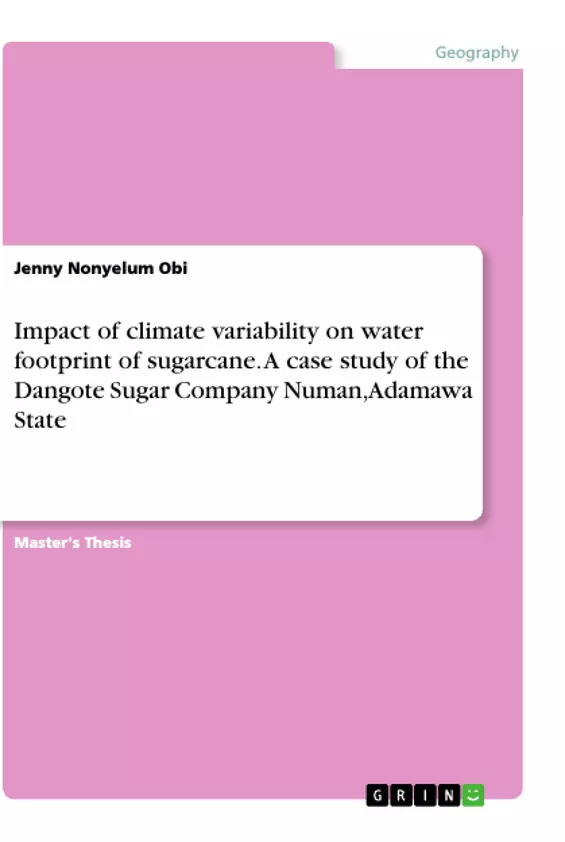This study is aimed at analysing the impact of climate variation on water footprint of Sugarcane using the sugarcane estate of the Dangote Sugar Company as a case study. Within this framework, the study’s specific objectives are the following. To determine the green and blue water footprint of sugarcane production. To assess the contribution of the individual climatic parameters to each of green and blue water footprint of sugarcane. To examine the relationship between climatic elements and overall water footprint pattern of Sugarcane.
There is an anticipation of a restructuring of the patterns of demand and supply of water for agriculture owing to possible effects of change in climate. Thus, the assessment of the influences of climatic variation on water consumption for agriculture is of import. Water footprint as an indicator provides a different methodology to the assessment of agricultural water consumption under variability of climate. This study offers an analysis of the impact of climate variability on the water footprint of sugarcane in Dangote Sugar Company, Numan during 1981-2013. Climate data was collected for a period of 33 years. Using the CROPWAT model, water footprint for sugarcane was calculated. The outcome was later correlated using the SPSS and SPSS AMOS 21 packages to find the relationship between water footprint of sugarcane and the climatic variation. Also the impact climatic variables had on water footprint of sugarcane was deduced. The results indicated that a) crop evapotranspiration and irrigation water requirements of sugarcane in the study area presented an uptrend and this is due to the variation in climatic factors; b) green water footprint (102 m3/ton) was lower than the blue water footprint (172 m3/ton) and; c) the climatic factors accountable for 17% of the variation in water footprint of sugarcane under the study period. From the results, it was observed that water footprint of sugarcane is influenced most by the rainfall element. However, there are other agricultural management factors that may also have an effect on it, even higher than that of climate. Attention however must be given for adaptation of effective strategies to reduce the agricultural production risk associatedwith climate change in the long run.
Inhaltsverzeichnis (Table of Contents)
- CHAPTER ONE.
- INTRODUCTION
- BACKGROUND OF STUDY
- STATEMENT OF PROBLEM
- AIM AND OBJECTIVES
- HYPOTHESIS
- SIGNIFICANCE OF STUDY
- STUDY AREA
- LOCATION AND EXTENT
- CLIMATE
- GEOLOGY AND TOPOGRAPHY
- SOIL
- VEGETATION
- ECONOMIC ACTIVITIES AROUND THE SUGARCANE ESTATES
- CHAPTER TWO.
- LITERATURE REVIEW
- INTRODUCTION
- CONCEPT OF CLIMATE CHANGE AND VARIABILITY
- MECHANISMS OF CLIMATE CHANGE
- MECHANISMS OF SEASONAL TO INTER-ANNUAL VARIABILITY
- CLIMATE CHANGEAND WATER RESOURCES
- CLIMATE VARIABILITY AND SUGARCANE CULTIVATION
Zielsetzung und Themenschwerpunkte (Objectives and Key Themes)
This research investigates the impact of climate variability on the water footprint of sugarcane production at Dangote Sugar Company in Numan, Adamawa State, Nigeria, during the period of 1981-2013. The study aims to assess the relationship between climatic factors and water consumption for sugarcane cultivation. The research utilizes the CROPWAT model to calculate water footprint, and statistical analysis using SPSS and SPSS AMOS 21 packages is employed to determine the influence of climate variability on water consumption.
- Climate Variability and Water Resources
- Water Footprint of Sugarcane
- Impact of Climatic Factors on Water Consumption
- Analysis of Green and Blue Water Footprints
- Adaptation Strategies for Sustainable Sugarcane Production
Zusammenfassung der Kapitel (Chapter Summaries)
Chapter One introduces the background of the study, highlighting the growing concern about climate change and its potential impact on water resources. The chapter outlines the research problem, aims, objectives, and hypothesis. It also provides a detailed description of the study area, including its location, climate, geology, topography, soil, vegetation, and economic activities surrounding the sugarcane estates.
Chapter Two delves into a comprehensive literature review on the concepts of climate change and variability, exploring mechanisms of climate change and seasonal to inter-annual variability. The chapter examines the relationship between climate change and water resources, emphasizing the impact of climate variability on sugarcane cultivation. It also discusses the water footprint concept and its significance in evaluating agricultural water consumption under varying climatic conditions.
Schlüsselwörter (Keywords)
The primary keywords and focus topics of the research include climate variability, water footprint, sugarcane, agricultural water consumption, CROPWAT model, green water footprint, blue water footprint, and adaptation strategies for sustainable sugarcane production.
Frequently Asked Questions
What is the "water footprint" of sugarcane?
The water footprint measures the total volume of freshwater used to produce sugarcane, categorized into green (rainwater) and blue (irrigation) water.
How does climate variability affect sugarcane water needs?
Variations in rainfall and temperature directly impact crop evapotranspiration and irrigation requirements, often increasing the demand for blue water footprint.
What were the findings at Dangote Sugar Company?
The study found that blue water footprint (172 m3/ton) was significantly higher than green water footprint (102 m3/ton), showing a high reliance on irrigation.
What is the CROPWAT model?
CROPWAT is a decision support tool developed by the FAO to calculate crop water requirements and irrigation needs based on climatic and soil data.
Which climatic factor has the most influence on sugarcane water use?
The study observed that rainfall is the most influential climatic element affecting the overall water footprint of sugarcane in the Numan region.
- Quote paper
- Jenny Nonyelum Obi (Author), 2016, Impact of climate variability on water footprint of sugarcane. A case study of the Dangote Sugar Company Numan, Adamawa State, Munich, GRIN Verlag, https://www.grin.com/document/921455



